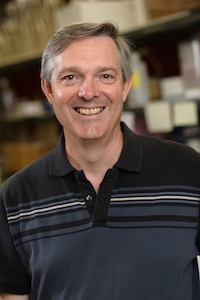
GRA Eminent Scholar in Biomedical Glycoscience
Professor, Biochemistry and Molecular Biology
Dr. Haltiwanger’s faith story
I was raised going to church, went to Sunday School and youth group, but never really felt a connection with Christianity. I was a good kid and everyone told me so. But when I got to high school, I wanted to have a good time, and I felt like I would disappoint people in the church if I did what I wanted to do. So when I left for college, I decided to stop going to church. I wanted to be who I wanted to be. During my first year I dove into having a good time, but it didn’t make me happy like I thought it would. In fact, by the end of my first year I was depressed and ashamed of several things I had done over the year. When I was home for summer, I went back to church and heard a simple presentation of the Christian faith (what the church calls the Gospel or good news). Christian’s believe that God made us, but that we wandered away from him, seeking to do what we wanted to do. Nonetheless, God loved us so much that he sent his son Jesus to draw us back to himself. He offered forgiveness for the shame we feel and healing for our souls. When I heard this simple presentation, I saw myself in the story, recognizing I had done the same thing, and realizing that I wanted and needed the forgiveness and healing offered by God. Over the next year I met several other Christians (including my future wife!) who helped me to learn more about God’s love for me and how to follow him.
I was studying biology and chemistry in college and was drawn to a career in academic research, but it seemed that this was not a career many Christians pursued. None of my professors seemed to be Christians, so I had this sense that I had to leave my brain at the door when I went to church. But this seemed inconsistent with Jesus’ teaching to love the Lord your God with all your heart and with all your soul and with all your MIND (my emphasis) and with all your strength. Reading books by C. S. Lewis (e.g. Mere Christianity, The Great Divorce, Screwtape Letters, Problem of Pain) helped me to see and understand that I didn’t need to leave my brain behind to believe in God, but I could use my brain to better understand and know both God and his creation. Since that time I’ve not felt any conflict between being a scientist and being a Christian. Several scientists who are Christians have expressed this same sentiment much better than I can in their works (e.g. The Language of God, Francis Collins; Quarks, Chaos and Christianity and others by John Polkinghorne).
After college I did doctoral work in biochemistry at Duke University and postdoctoral work at Johns Hopkins University School of Medicine, ultimately joining the faculty of the Department of Biochemistry and Cell Biology at Stony Brook University as an Assistant Professor. I rose through the ranks to Professor, eventually serving as the Chair of the department. After 23 years at Stony Brook, I accepted a position as a Georgia Research Alliance Eminent Scholar in the Complex Carbohydrate Research Center here at UGA. Throughout my entire career, it has been my privilege to think God’s thoughts after him by studying his creation.
The heavens declare the glory of God; the skies declare the work of his hands. Psalm 19:1
